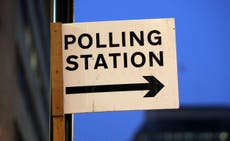Boris Johnson may be prime minister for a long time - but he is likely to be the last PM of a united kingdom
Johnson could be in No 10 for two terms, but the fact the SNP are likely to gain seats will put the union at risk

It cannot be denied that this is a triumph for Boris Johnson. Even if the exit poll has overestimated the number of Conservative seats, the party is heading for a historic majority.
The Conservative Party was flat on its back when Theresa May failed to take the country out of the EU. No one believed Johnson when he said he would deliver Brexit in October “come what may”.
But the countdown to the shortest tenure in prime ministerial history went quiet when he overtook George Canning in November, and now he could be a two-term prime minister just as he was a two-term mayor of London.
Elections are sometimes simple affairs. Johnson judged the mood of the country. Leavers and – crucially – many Remainers felt that the country was stuck, with a deadlocked parliament to blame.
That stunt with him driving a backhoe loader through a wall of blocks with “Gridlock” written on them was daft, but it was the right visual metaphor.
It wasn’t just Brexit that won it, though: Johnson’s character was important. Labour partisans may regard him as an unspeakable moral vacuum, but floating voters – they existed in this election despite the polarisation of the past four years – looked at him differently. You only have to ask whether Johnson or Jeremy Corbyn is more capable of governing to know their answer.
And the paradox of a big majority is that Johnson may be liberated to be the One Nation liberal Conservative he has always claimed to be. He could possibly deliver a softer Brexit than the Eurosceptic Spartans wanted. Why, he may even deliver a trade deal with the EU in a year’s time – and if it isn’t ready in time, does anyone seriously think he will keep his word to refuse to ask for an extension to the transition period?
With a majority like that, he has a free hand unfamiliar to anyone in British politics since Tony Blair’s time – given that Gordon Brown was struggling for all his three years with the financial crisis.
A big majority ensures not only that internal potential opponents feel the smack of firm government, but it scatters the external opposition too. The Labour Party is in a terrible position. How many of its MPs must regret voting against Theresa May’s Brexit deal. They could have ensured a softer Brexit and kept a weakened Tory party in power.
The Labour leadership campaign that was under way will now burst into the open, but this does not look like a party that can turn itself and the country round in less than five years.
As for Jo Swinson, if she holds her Scottish seat, this should be the end of her short leadership too. It was her decision to hold this election. She may have been right that it was the only chance to stop Brexit – but it hasn’t worked and her party has failed to capitalise on the wave of defections that had boosted its numbers in parliament.
But election victories always contain the seeds of their ultimate destruction, and it is quite easy to see what some of those might be this time. The reassertion of the Sturgeon Supremacy in Scotland will put the United Kingdom under new strain. Scottish opinion polls in this election have not only suggested that the Scottish National Party was going to gain lots of seats in the House of Commons, but also that Scottish opinion is now split 50-50 on the question of independence.
It may be that the UK leaving the EU at the end of January would make that harder, because the SNP would have to argue to leave one union and to apply to rejoin another, but that is a real life experiment over which Johnson is going to preside.
At the same time, Brexit is going to push Northern Ireland further from the rest of the UK and closer to the Republic.
Boris Johnson may be prime minister for a long time, but he may be the last prime minister of the UK.



Join our commenting forum
Join thought-provoking conversations, follow other Independent readers and see their replies